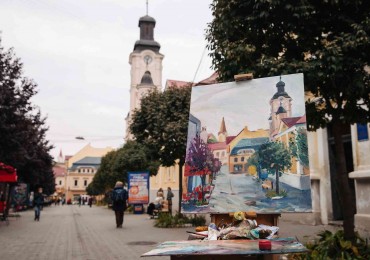
Decentralization: why it is important to develop regions with the help of art projects and new culture centres
2017

Glasgow School of Art (GSA), graduates of which regularly receive the most prestigious British art award Turner Prize and which is popular among the most of the world's art schools, is located not in the capital of Great Britain London, but in the main city of Wales - Glasgow. Thanks to the art school, the city is considered one of the cultural centres where the global elite of the of art world comes. And, with the elite, there comes those who are reaching for it-collectors, investors, travellers from different countries. Who benefits from this? Everybody. The city and its residents, as well as the whole Britain, which thus develops culturally and economically different parts of its great country.
Illustrative example of how only one art object has transformed an industrial city into a mecca of contemporary art - Bilbao. In 1997, under the project of Frank Gehry, a branch of the famous New York Guggenheim Museum was opened in Bilbao. The construction cost 90 million euros to the authorities and investors. The museum became a visiting card of the city, thanks to which its economy, thanks to huge tourist flows, has grown dramatically. Moreover, the reputation of the Basque capital changed - instead of a dreary port city, it became one of the world's cultural centres.
Admittedly, Bilbao's new face was acquired not only by the well-known museum, but also by the design of the city's metro. The latter was designed by the architectural bureau of the best man in this business Norman Foster. In a word, the city blossomed. First of all - economically, about 1.5 million people visit it annually, which brings Bilbao approximately 200-250 million euros per year.
The “Bilbao effect” has worked in other cities of the world, which are not the capitals of these or those countries. So, it can work in Ukraine. And, it's not about Kyiv.
The so-called decentralization with the help of art - the holding of large-scale cultural events, festivals, construction of museums, opening of art schools - is what some regional centres of Ukraine are now striving for. For example, Uzhhorod.
City, which is the cradle of the Transcarpathian school of painting, seems to have set foot on a new stage of cultural development. Everything started with the student contest “Silver Easel” in 2016, which was attended by students of 22 educational institutions of art profile from all over Ukraine.
As a result, the contest marked the beginning of the larger and long-ripening idea. In the current year, the founders of art and culture foundation Brovdi Art - the couple Nataliya and Robert Brovdi - will hold the second “Silver Easel” contest on April 25-29, and this is only the first stage of their large cultural and educational project for their native city. It is about creating an art platform in Uzhhorod, part of which will be a museum, a gallery, an art school for children, studios for artists, art radio, etc.
A new cultural cluster, which will work by the end of 2017, may serve as a good example for other regional centres, which also boast of strong schools of painting. And, then Ukraine will have its own examples of the “Bilbao effect” – “Uzhhorod effect”, “Odesa effect”, or “Kharkiv effect”.
Halyna Brailovskaia,
Information-analytical portal In-Art
Stay up to date with art events, subscribe
